
"Thank God I'm a Country Boy", also known as "Country Boy", is a song written by John Martin Sommers and recorded by American singer/songwriter John Denver. The song was originally included on Denver's 1974 album Back Home Again. A version recorded live on August 26, 1974, at the Universal Amphitheatre in Los Angeles was included on his 1975 album An Evening with John Denver. The live version was released as a single and went to No. 1 on both the Billboard magazine Hot Country Singles and Billboard Hot 100 charts. The song topped both charts for one week each, first the country chart, and the Hot 100 chart a week later. Thank God I'm a Country Boy also became the name of a variety special show hosted by Denver in 1977.

"Lady Marmalade" is a song written by Bob Crewe and Kenny Nolan, originally for Nolan's disco group. The song is famous for the repeated refrain of "Voulez-vous coucher avec moi?" in French as part of the chorus, a sexually suggestive line that translates into English as: "Do you want to sleep with me?" The song first became a popular hit when it was recorded in 1974 by the American funk rock group Labelle and held the number-one spot on the Billboard Hot 100 chart for one week, and also topped the Canadian RPM national singles chart. In 2021, the Library of Congress selected Labelle's version for preservation in the National Recording Registry for being "culturally, historically, or artistically significant".

"Da Ya Think I'm Sexy?", also written "Da' Ya' Think I'm Sexy", is a song by British singer Rod Stewart from his ninth studio album, Blondes Have More Fun (1978). It was written by Stewart, Carmine Appice and Duane Hitchings, though it incorporates the melody from the song "Taj Mahal" by Jorge Ben Jor and the string arrangement from the song "(If You Want My Love) Put Something Down On It" by Bobby Womack.

"Hard to Say I'm Sorry" is a 1982 power ballad by the group Chicago. It was written by bassist Peter Cetera, who also sang the lead vocals on the track, and producer David Foster. It was released on May 17, 1982, as the lead single from the album Chicago 16. On September 11 it reached No. 1 for two weeks on the Billboard Hot 100. It was the group's second No. 1 single. It was their first top 50 hit since "No Tell Lover" in 1978 and it spent twelve weeks in the top 5 of the Billboard Hot 100. The single was nominated for a Grammy Award for Best Pop Performance by a Duo or Group with Vocal, and was certified gold by the Recording Industry Association of America (RIAA) in September of the same year. Songwriter Cetera, a member of the American Society of Composers, Authors and Publishers (ASCAP), won an ASCAP Pop Music Award for the song in the category, Most Performed Songs.

"I'm Not in Love" is a song by British group 10cc, written by band members Eric Stewart and Graham Gouldman. It is known for its innovative and distinctive backing track, composed mostly of the band's multitracked vocals. Released in the UK in May 1975 as the second single from the band's third album, The Original Soundtrack, it became the second of the group's three number-one singles in the UK between 1973 and 1978, topping the UK Singles Chart for two weeks. "I'm Not in Love" became the band's breakthrough hit outside the United Kingdom, topping the charts in Canada and the Republic of Ireland as well as peaking within the top ten of the charts in several other countries, including Australia, Germany, New Zealand, Norway and the United States.

"How Do You Talk to an Angel" is a song written by Steve Tyrell, Barry Coffing, and Stephanie Tyrell. It was the theme for the American TV series The Heights. The single was released with Jamie Walters as the lead singer, and it reached number one on the US Billboard Hot 100 on November 14, 1992, but the series was canceled exactly one week after the song fell from its number one position. Vocalists on the single included Shawn David Thompson, Cheryl Pollak, and Charlotte Ross, as well as Zachary Throne from the Las Vegas rock band Sin City Sinners.
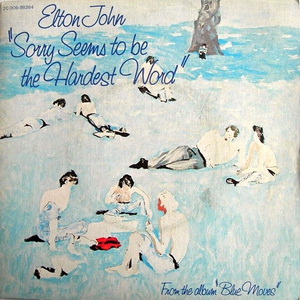
"Sorry Seems to Be the Hardest Word" is a song written by English musician Elton John and songwriter Bernie Taupin. It was recorded by Elton John and released in 1976, both as a single and as part of the Blue Moves album. It was John's second single released by The Rocket Record Company. The song is a mournful ballad about a romantic relationship which is falling apart.
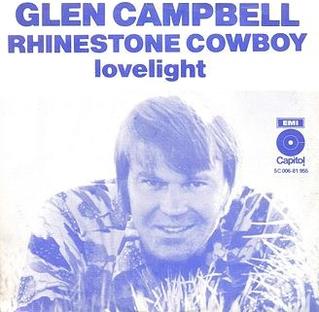
"Rhinestone Cowboy" is a song written by Larry Weiss and recorded by American country music singer Glen Campbell. When released on May 26, 1975, as the lead single and title track from his album Rhinestone Cowboy, it enjoyed huge popularity with both country and pop audiences.

"Nikita" is a song by English musician Elton John from his 19th studio album, Ice on Fire (1985). It was released as the album's lead single on 4 October 1985, charting at number three on the UK Singles Chart, peaking at number seven in the United States, and reaching the top 10 worldwide, topping the charts of eight countries. The song features George Michael on backing vocals and Nik Kershaw on guitar.
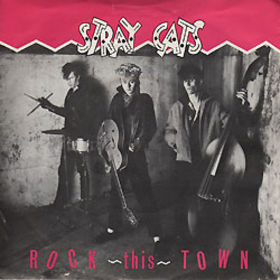
"Rock This Town" is the second single by American rockabilly band Stray Cats, released January 30, 1981 by Arista Records in the U.K., where it peaked at No. 9 on the Singles Chart. It was taken from the band's 1981 debut album, Stray Cats.

Windsong is the ninth studio album recorded by American singer-songwriter John Denver, which was released in September 1975. Denver's popularity was at its peak by this time.
"Tired of Being Sorry" is a song written by American singer-songwriter Scott Thomas for his band, Ringside. Spanish singer Enrique Iglesias later covered the song and released it as the second international single from his album Insomniac (2008). This version achieved success in several European countries, where it was a top-10 hit. In 2008, the song was re-recorded as a bilingual duet with French singer Nâdiya under the title "Tired of Being Sorry (Laisse le destin l'emporter)" and became a hit in French-speaking regions.
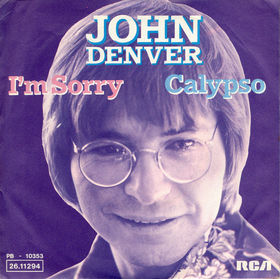
"I'm Sorry" is a song written and recorded by American country-folk singer-songwriter John Denver and released in 1975. It was the final number-one pop hit released during his career.
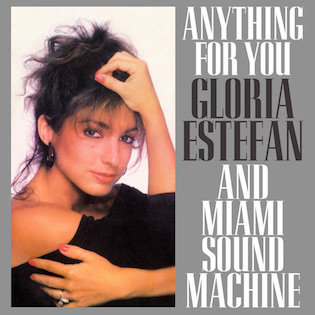
"Anything For You" is a 1988 ballad written by Cuban-American singer and songwriter Gloria Estefan and sung by Estefan and Miami Sound Machine. The song appeared on their 1987 album Let It Loose. After years of fluctuating success in the United States, "Anything for You" marked a breakthrough for the group when it topped the Billboard magazine Hot 100 chart on May 14, 1988, and remained there for two weeks. It was the first of three number-ones for Estefan. Due to the success of the single, the album Let It Loose was re-released with the title Anything For You outside North America. The song also spent three weeks at #1 on the Adult Contemporary chart and peaked at #3 on the Hot Latin Tracks on June 25, 1988.

"How 'Bout Us" is the most successful single released by R&B music group Champaign. Composed by band keyboardist Dana Walden and originally released on the band's debut album How 'Bout Us, the title track peaked at number 12 on the Billboard Hot 100. A romantic ballad, the song was released on Valentine's Day, 1981.

"Casanova" is a 1987 single by American R&B vocal group LeVert, written and produced by Reggie Calloway. It reached number five on the Billboard Hot 100 singles chart and number nine on the UK Singles Chart, LeVert's only Top Ten on either chart. It was the first new jack swing song to reach number one on the Billboard Hot Black Singles chart. It topped the chart for two weeks, becoming the group's second number-one. It has become a standard number for New Orleans brass bands following its popularization by the Rebirth Brass Band. The song is featured in 1987's The Pick-Up Artist, starring Robert Downey Jr. and Molly Ringwald, and appears on the soundtrack album of the Whoopi Goldberg movie Fatal Beauty, released the same year.

"Sorry, I'm a Lady" is a song co-written by Rolf Soja and Frank Dostal, and performed by Spanish duo Baccara. It was released in 1977 as the second single from their debut album, Baccara (1977). The song was a number one hit in Austria, Belgium, the Netherlands, Norway and West Germany.
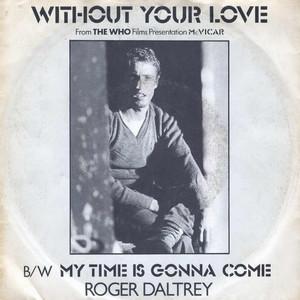
"Without Your Love" is a song released in 1980 by Roger Daltrey of The Who written by Billy Nicholls and was a hit for him on his album McVicar. The song was included in the soundtrack of the film McVicar, a bio-pic of English bank robber John McVicar, that was produced by Daltrey and also featured him in the starring role. The original version of the song was by Billy Nicholls himself with his band White Horse in 1977.

"Sorry for Party Rocking" is a song by American duo LMFAO from their second studio album of the same name. It was released as the fourth and final single from the album on January 17, 2012, and was the group's last before their indefinite hiatus in September 2012. The song was written and produced by Redfoo and Erin Beck.

"Sexy and I Know It" is a hit song by American duo LMFAO from their second studio album, Sorry for Party Rocking. It was released as the third single from the album on September 16, 2011. The song was written by Stefan Kendal Gordy, GoonRock, Erin Beck, George M. Robertson and Kenneth Oliver, and it was produced by Party Rock. It went to number one on the Billboard Hot 100 on January 7, 2012, and remained there for two weeks.



















